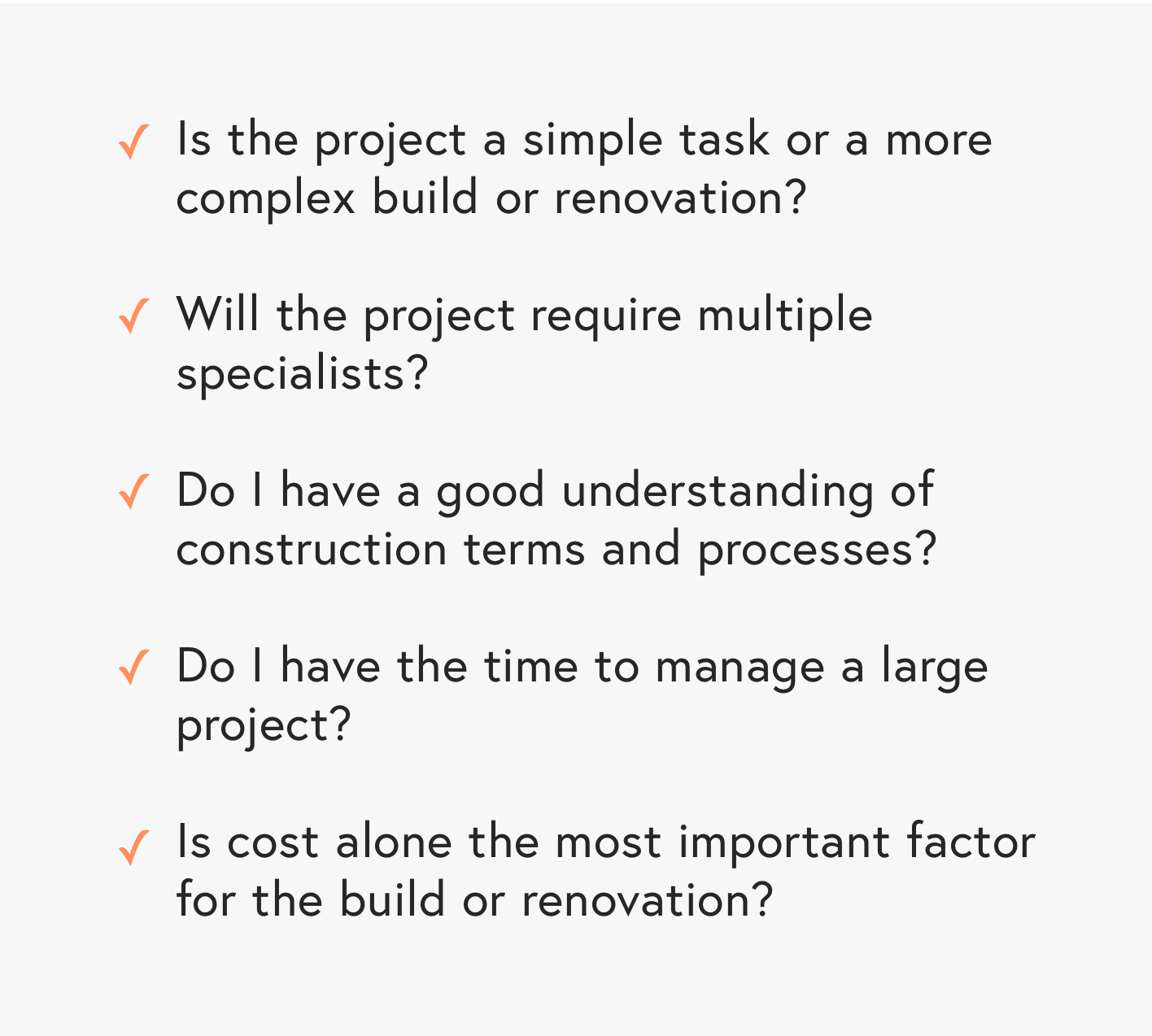Do I Need a Builder or Contractor to Manage My Project?
Old World Craftsmen is a design-build company set up to take clients from concept through completion, unburdening the client from procurement, permitting and managing the construction phase itself. We’ve proven this model to be a formula for success for mid to large sized renovations, especially for today’s busy clients. But let’s be plainly honest- it’s not the model for everyone. Here we discuss questions to consider when determining what sort of service fits your needs the best.
HOW LARGE IS YOUR PROJECT?
If your project is small, you may get the best service and possibly save money by hiring a handyman directly. For example, if you want to build out a closet, you could have a verbal conversation with a competent handyman and perhaps map the footprint with tape on the floor.
WHAT IS THE NATURE OF YOUR PROJECT?
If you want to replace your roof or paint a room, it may be most straightforward to hire the specialist directly. Even in a simple job, you should be prepared for possible complications that the specialist may or may not handle.
A couple of examples to illustrate:
Interior Design and Renovation in South Salem, NY
Roofing: Most roofers, if they find rot due to a leak, will replace sheathing or rotten fascia boards as a matter of course in their work. But if they discover structural problems or insulation problems, you may have to bring in carpenter or even an architect to address it.
Painting: a painter may discover outlets that have been painted over or moldings that need replacing or doors that don’t function. You may then need an electrician or carpenter to address other issues.
Complex Renovations
If, on the other hand, your project is a kitchen or bathroom renovation, the project will consist of many, many “moving parts” and details. There will be dependencies, critical dimensions, and you might be amazed at how many components are needed. In these types of projects we’d generally recommend a qualified builder to thoughtfully manage the project and bring years of construction expertise for efficiency, expert communication between curated trades, design vision, etc.
A simple question to ask yourself is: how many specialists will be required for my project?
For example, a kitchen will require a carpenter, an electrician, a plumber, flooring or tile specialist, stone fabricator and possibly an HVAC specialist or drywall installer and taper to name a few!
Building Permit
Another important question is whether you will be filing for a building permit for your job. (See “Do I need a building permit”) If you do, you’ll need to figure out how to pilot your way through the permitting and approval process and know about required inspections. Are you willing to do so, and do you have the time to tackle this?
WHAT IS YOUR CONSTRUCTION KNOWLEDGE BASE? HOW WELL DO YOU UNDERSTAND DEPENDENCIES?
The more construction knowledge you have, the more complex the project you can consider managing yourself.
Do the experiment of asking yourself some sample questions:
Do you know the order in which each specialist will need to be called in?
Do you have a good idea what work each specialist performs?
Do you speak “construction language” well enough to coordinate the plumber, electrician, HVAC contractor, tile man, sheetrock crew, and carpenter?
Do you have a general idea of the “guts” of your house – framing members, pipes, wires, ducts?
Are you good with layout, with a good mind’s eye? So you can prevent the electrician putting his switch half way onto your tile or in your door molding? So you can make sure the plumber’s supply lines land nicely in your vanity with shelves and drawers? So the baseboard lands nicely on the shower threshold?
Are you familiar with the “rough-in” and “finishing” phases? We’ll cover more about this in another article, but you’ll want to have an idea of what this means and what each phase encompasses to effectively “GC” your own project.
Do you have some familiarity with NY or CT building codes? Do you know what inspections are required?
Here’s a couple of specific (though a little random, we know) example questions you could ask yourself:
Do you know that the plumbing will need a vent line that the plumber often runs through the area of the recessed medicine cabinet if not otherwise directed?
Do you know that the code requires a dedicated electrical circuit to your bathroom outlet?
Do you know when stainless steel vs. galvanized vs. uncoated fasteners should be used?
Do you know options of what wood or projects are best for exterior?
Are you familiar with galvanized pipes? Aluminum or knob and tube wiring?
a good BUILDER will shoulder the load of REALTIME MANAGEMENT.
If you have a full-time job, you may not be available to provide timely answers to questions from the jobsite. A good builder will shoulder this responsibility.
How much time to you have or are you willing to dedicate to the project management?
Do you have good availability for on the spot decisions and judgement calls?
This is a critical question to ask yourself. If you don’t have a full time job, and you like daily “nitty-gritty” details you may get some satisfaction from managing your own project. Remember that there will be dozens of questions, even from qualified tradesmen, all of which will have to be answered in a timely manner to keep the project moving, and some of which will require on the spot decisions.
Here’s just a few examples of the host of questions that will need thoughtful answers:
How high do you want the shower valve?
Where do you want the switches? What fixtures should be switched together?
What molding do you want on the door? The baseboard? Are they a good match?
Which direction do you want to run the tile or flooring in? What grout width do you want?
How should the ductwork be run to the new space? How will the exhaust fan vent to the exterior?
Where do you want dimmers, countdown timers, 3 way switches?
What kind of finish do you want on your flooring?
Do you want to replace the old pipes?
How much do you trust the Tradesmen you plan to use?
A highly qualified veteran builder has built up an incredible store of knowledge of building science, codes and implementation of mechanical systems. When you GC your project, you will be depending heavily on the specialists and tradesmen to provide and communicate this knowledge. It is a very rare customer indeed who has intimate knowledge of building codes and best practices. This means you’ll be leaning on each individual tradesmen to know and implement code compliant and high quality work.
Quality Standards


Are you confident that your team members/vendors share your quality standards? I am very picky about my molding and finishing work, and have had the experience of a tradesman insisting that the work is satisfactory the way it is even when I’m not satisfied. After a quarter of a century in the business we have solid and effective ways of overcoming any resistance to meeting standards of excellence.
Ask yourself if you are willing to and are comfortable handling a quality issue should it arise.
Building Codes
A master builder will have developed a working knowledge of the building codes related to every aspect of construction of the types of projects they manage. You’ll need tradesmen who you implicitly trust to do code compliant work and use code compliant materials since you won’t have the builder’s eye to catch any oversights.
Pricing
One value that an excellent builder brings to a project is a keen eye reviewing the proposals of each tradesman for those sometimes sneaky “not included” items and for doing a constant “sanity check” on pricing from trades and determining if any extra charges are legitimate or rather are a result in oversights of the tradesman. Ask yourself if you are willing and able to do this review and negotiation.
Order of operations & Division of Labor
You’ll also be counting on the tradesmen to help you know who needs to do what piece of the project next, and who is responsible for each component.
When should the electrician install the wiring and electrical boxes, outlets & switches, and finally the lights?
Who installs the floor warming cables under the floor?
Should painting or floor finishing be done first?
When does the radiator get installed?
Who installs the thermostat wire for the HVAC system? Who installs the electrical supply?
Who runs the gas line for the furnace?
Do you have a relationship with each vendor with this level of trust?
Is the lowest project cost the most important priority?
There are some situations where the lowest project cost may be the highest priority. In these cases, hiring someone to manage the project may be unfeasible. A couple of examples include:
An emergency repair
Work that must be done for safety at a time when the client doesn’t have the resources.
Some investments might not turn a profit with a builder managed project.
Work where quality isn’t important (Is this even a reality?)
Will I save money by not hiring someone to manage my project?
A builder or general contractor, like any service, charges a fee for their services. This is generally a percentage on top of the costs of labor, materials and subcontractor costs. IF you are a good manager, you might be able to save some or all of this fee.
Trade Pricing and Relationships
A veteran builder will have built up vendors and resources with the best possible pricing. Sometimes it takes years to cultivate relationships with vendors who will offer discounted pricing to only their best and most responsible customers. The builder has put together a team of carpenters and specialists who offer work that meets his standards at fair pricing. If the builder can purchase things at a price point lower than you can, even with his markup you might be paying the same or less.
Design-Build Value Engineering Add
Custom Front Gable in Greenwich, CT
Something unique to the design-build model is that the experienced builder can participate in value engineering your project for the best possible “bang for your buck.” He might know a less expensive entry door model that delivers the same look and performance you are looking for, or a way of accomplishing a trim or cabinetry project that can save significantly. As an example, our company works with a local CNC shop to produce custom cabinetry parts for built in units at a 30% lower price than field assembled or showroom purchased millwork.
Rework Cost
A skilled veteran builder prevents a dozen problems a day by having the master plan, or “birds eye view” of the project their head through the whole project. They must predict when the HVAC guy might run his duct where the plumbers pipes go, when the carpenter might put a structural member where a wire or fixture needs to be, how wide the molding is so the electrical box doesn’t sit half way in the molding… and on and on.
Projects managed by an inexperienced GC will almost always have at least a little rework or redo because something was missed, done out of order, or didn’t come out quite right. This creates additional cost and schedule delays. You should know this going in and understand that a little bit of the savings will be eaten up by this.
Lastly, Cost of your Time
Your time has a value – specifically a financial value. It’s hard to assign an exact number since we don’t know what you do for a living or what you perceive as a fair salary for your time. For a thought experiment, let’s assign a VERY conservative $40/ hr. for your time. Prior to the project in the design phase of our thought experiment project, you might spend a month doing an average of 2 hours a day in design and selection/shopping for products. Let’s say you decide to take on a 6 week project. Figure on spending about 2-3 hours a day managing schedule, coordination, procurement and design decisions.
Design Time
(PRIOR TO THE PROJECT)
2hrs/day x 5 days a week x 4 weeks = 40 hours
Management Time
(DURING THE PROJECT)
2.5hrs/day x 5 days a week x 6 weeks = 75 hours
Cost of Your Time
(OVER ENTIRE PROJECT)
(40hrs + 75hrs) x $40/hr. = $4,600
Wow!! You may look at this as a SAVINGS or as a huge EXPENDITURE of your work! In the end, managing your project is NEVER free. It’s just whether you want to pay an expert to do it, or do the labor yourself. It’s good to make an educated decision, knowing your labor effort in advance.






